PH senior citizens in a time of pandemic
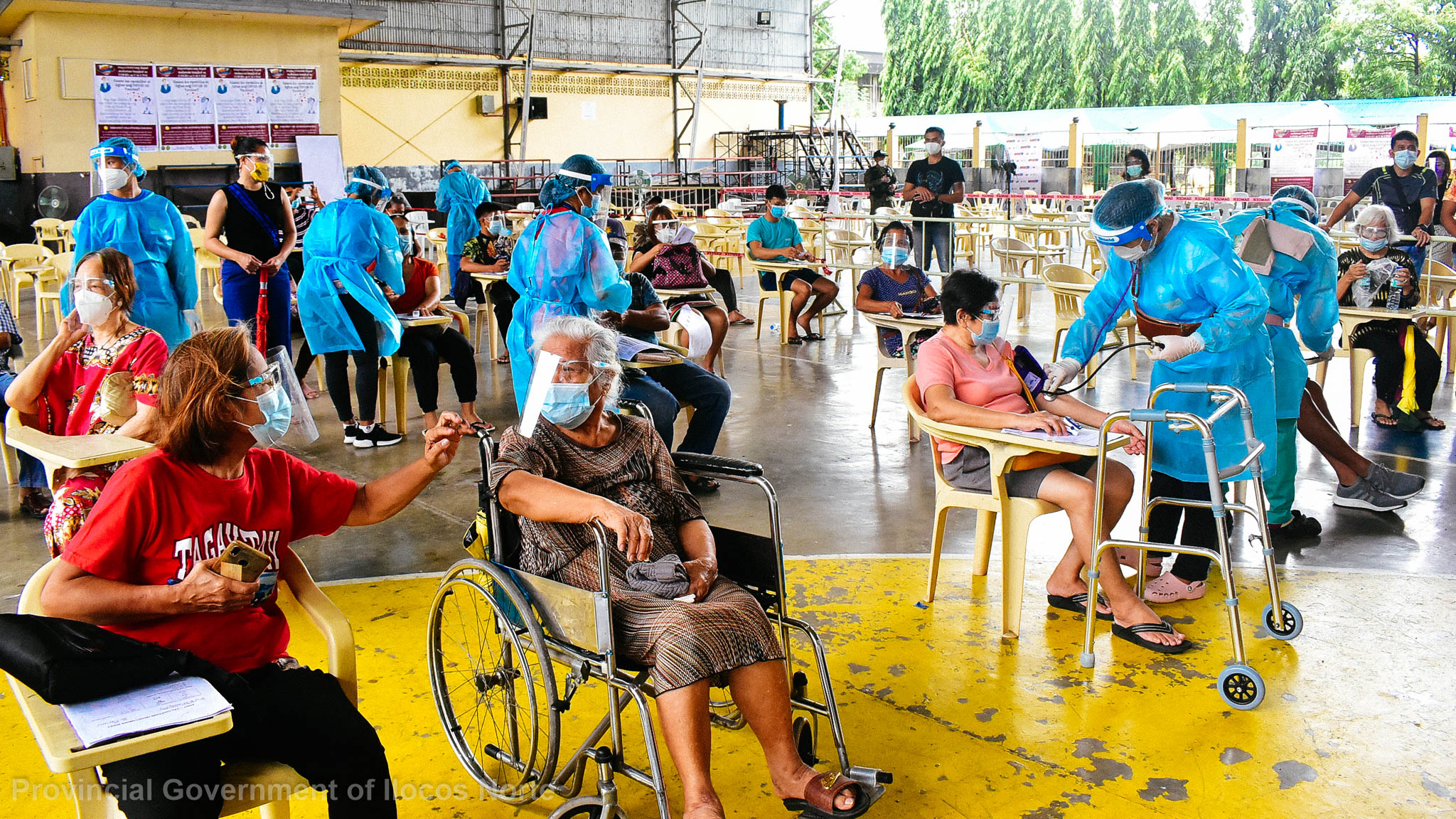
Senior citizens in Ilocos Norte receive their vaccines at a COVID-19 vaccination facility. The provincial government is expecting to ramp up its vaccination drive to achieve herd immunity. (Photo courtesy of Ilocos Norte provincial government)
MANILA, Philippines—The first week of October, through Proclamation No. 470 signed by then-President Fidel Ramos on Sept. 26, 1994, has been declared as Elderly Filipino Week.
According to the proclamation, the Executive Department, through the Department of Social Welfare and Development, is tasked with developing a social welfare program promoting the wellbeing of the elderly.
According to latest data from the Philippine Statistics Authority, there were 12,336,355 Filipinos aged 60 years old and above as of May 2020.
The total number of senior citizens was 11.31 percent of the country’s estimated total population at 109,035,343, based on the 2020 Census of Population and Housing (2020 CPH).
Francisca Susano, from Negros Occidental province, who is considered the oldest living person in the country, celebrated her 124th birthday in September.
The plaque awarded by the National Commission on Senior Citizens (NCSC) also claimed that Susano, born on Sept. 11, 1897, is also the oldest person in the world.
READ: Oldest living Filipino feted on 124th birthday
The COVID-19 pandemic has, however, added a never before seen dimension in how the national government should treat senior citizens.
COVID cases, vaccination efforts
The United Nations (UN), in its policy brief on the impact of COVID-19 on older persons published in 2020, emphasized that senior citizens are highly likely to contract SARS Cov2 — the virus that causes COVID-19.
The UN added that elderly people were at a significantly higher risk of mortality and severe disease following infection.
The US Centers for Disease Control and Prevention (CDC) cited several reasons for higher COVID risks among seniors.
These include:
- Senior citizens are more likely to have underlying, long-term health problems.
- People’s immune system tend to weaken with age, which makes it harder for older people to fight off infections.
- Inflammation tends to be more intense among elderly persons, which increases the risk of organ damage.
- Respiratory diseases, such as COVID-19, are considered a concern among older adults as their lung tissue becomes less elastic over time.
In the Philippines, data from the Department of Health (DOH) showed that while COVID-19 infections were fewer among Filipinos aged 60 and above than those among younger age groups, the mortality rate among older patients was much higher.
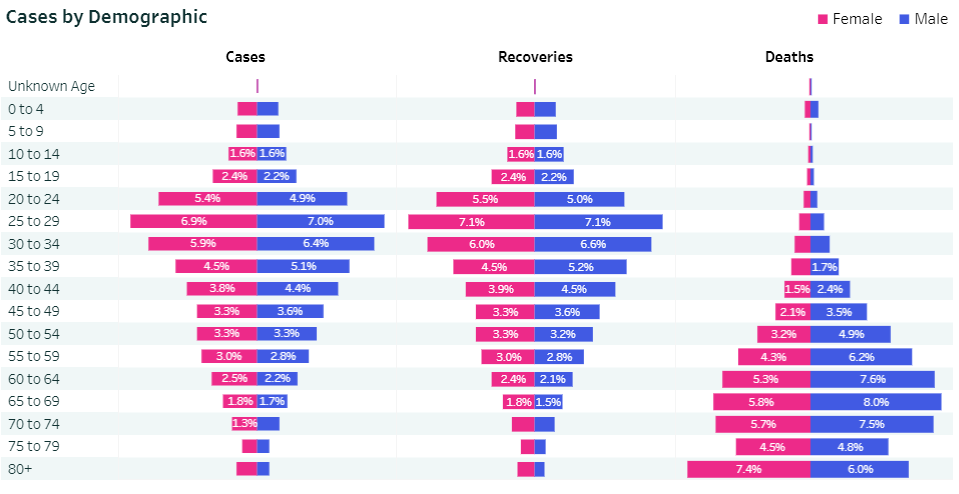
Screenshot from DOH’s COVID-19 Tracker
Data as of Oct. 4 showed that there are already 119,484 total cases among Filipinos aged 60 to 64 years old. The total recoveries in the same age group were 108,873, while there are a total of 4,972 deaths recorded.
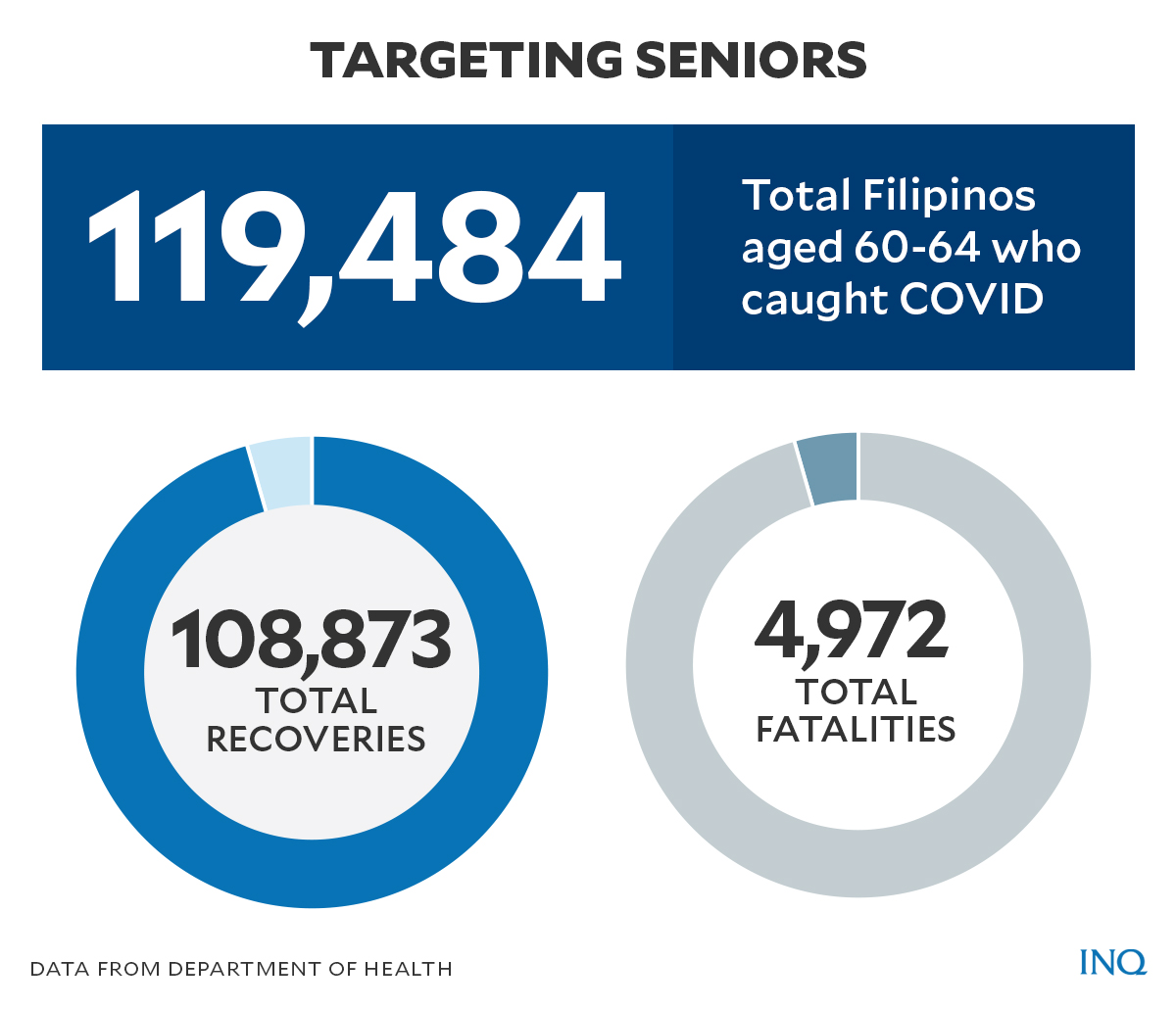
Graphic by Ed Lustan
Among those between ages 65 to 69 years old, 89,774 have already been taken ill with COVID-19. Still, at least 79,590 have recovered, while 5,328 died.
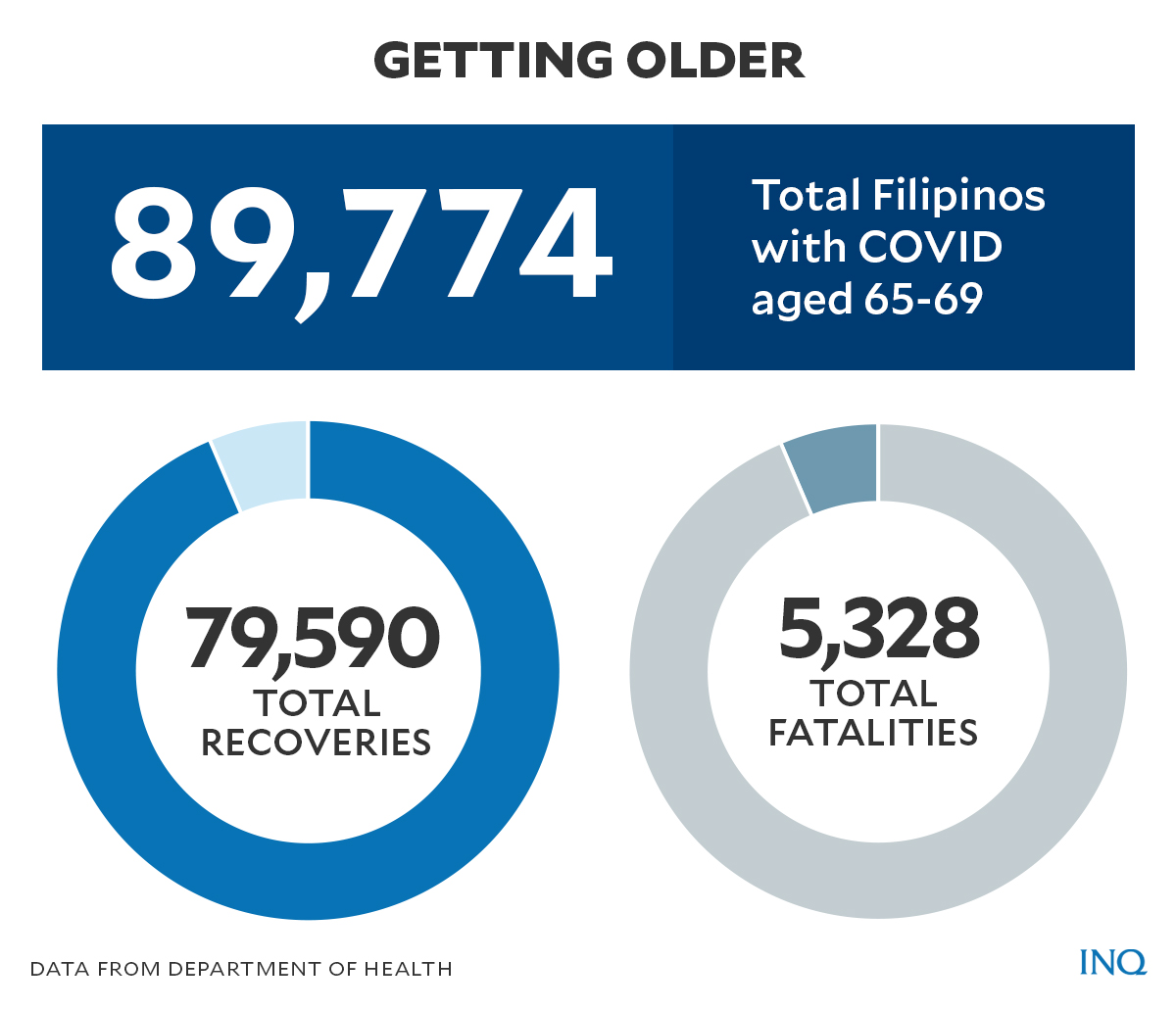
Graphic by Ed Lustan
In the 70 to 74 age group, 65,182 cases were logged. Around 56,400 were tagged as recovered and 5,109 were marked as deaths.
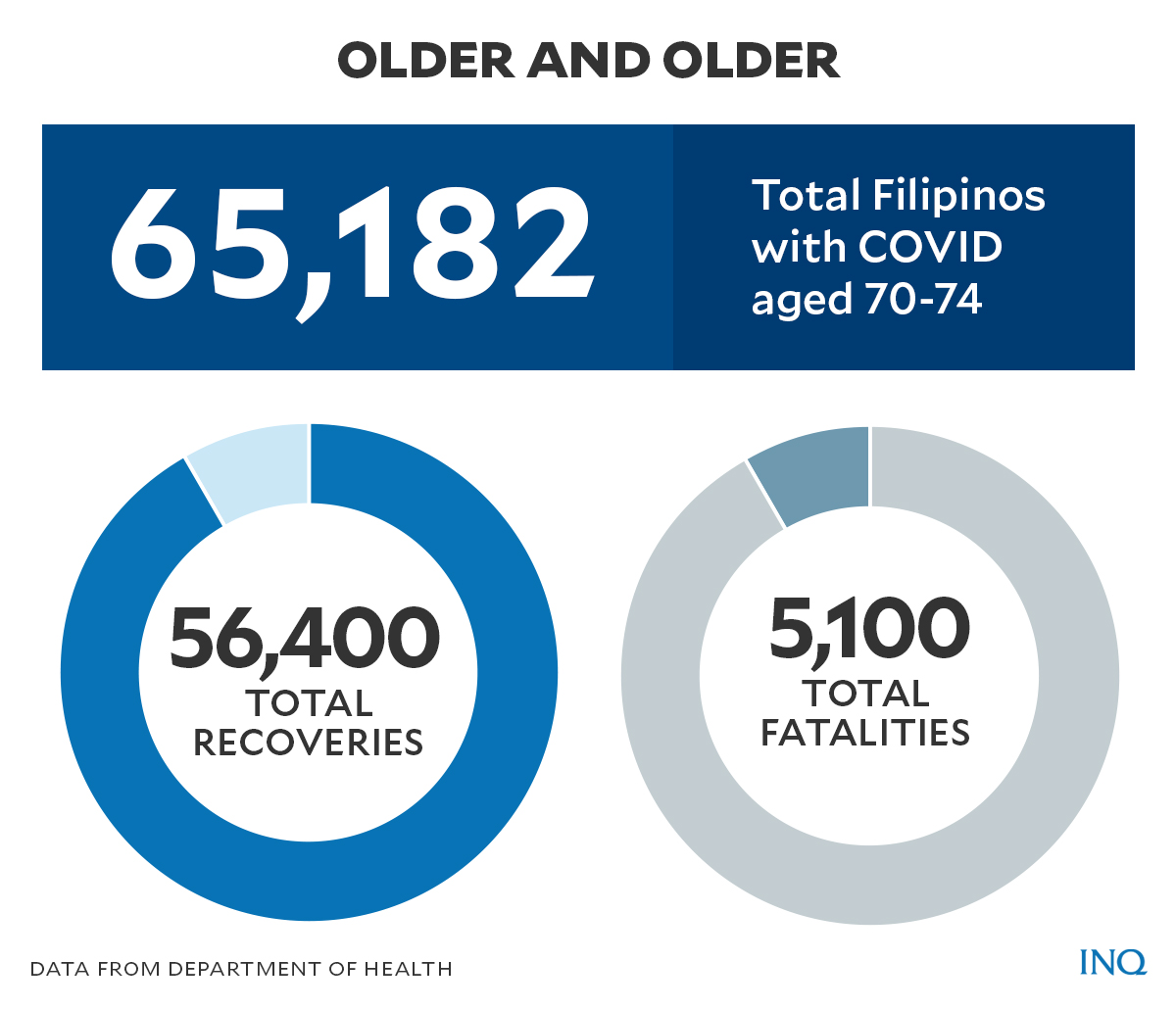
Graphic by Ed Lustan
A total of 38,449 cases, around 32,436 recoveries, and 3,573 deaths were listed in the 75 to 79 age group.

Graphic by Ed Lustan
The DOH also recorded 45,379 COVID-19 positive individuals aged 80 and above. At least 37,074 of them recovered while 5,191 died.
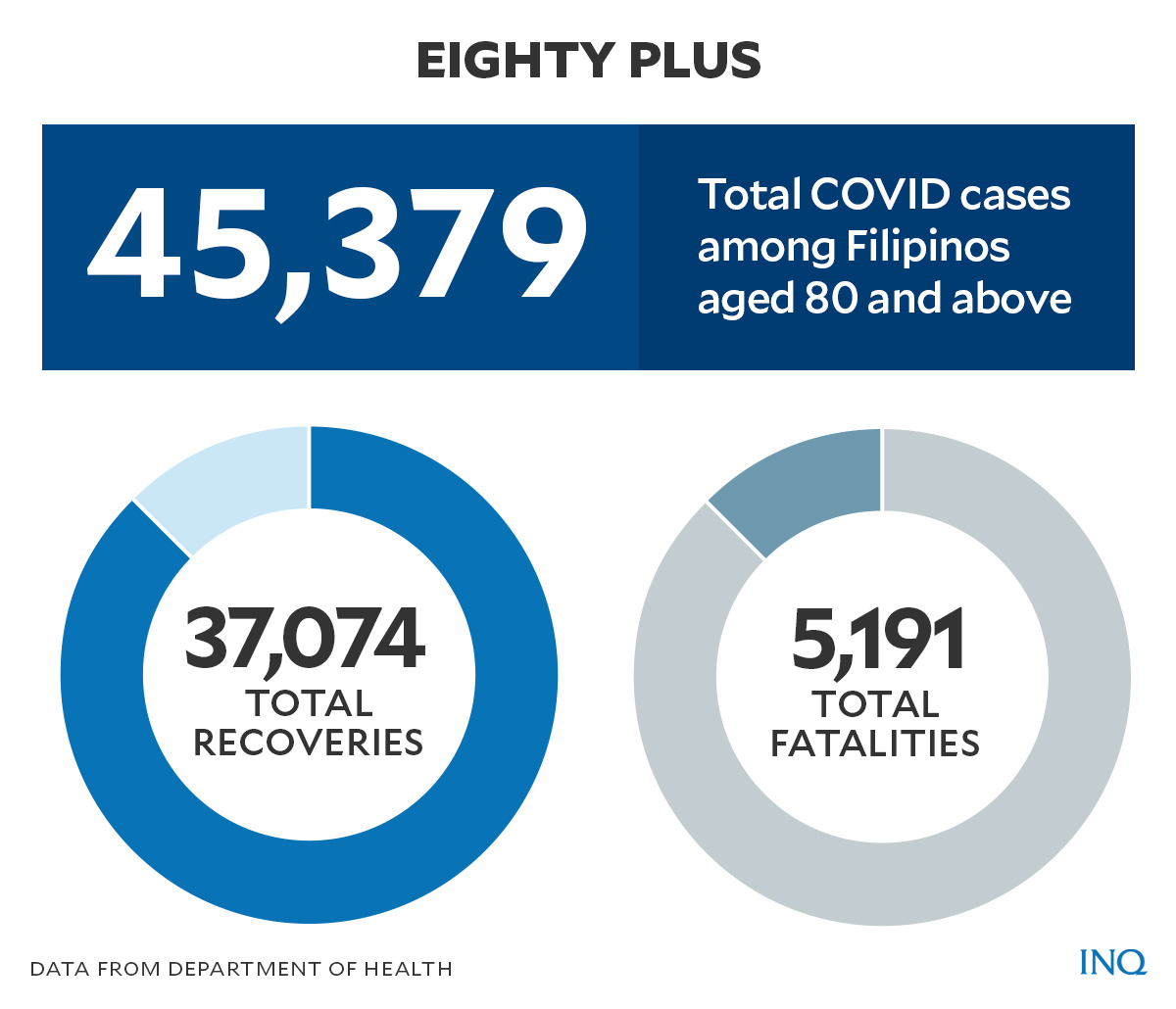
Graphic by Ed Lustan
Amid the increasing cases of COVID-19 in the country, paired with the rising threat of the different COVID-19 variants, the national government has been pushing vaccination progress among senior citizens.
Data breakdown of the country’s vaccine tracker showed that as of Sept. 5, around 4,016,318 individuals in the A2 category—senior citizens aged 60 and above—have already been fully vaccinated against SARS Cov2.
At least 3,427,089 from the same priority group have received their first doses of COVID-19 vaccine.
In August, the World Health Organization (WHO) expressed concern over the “unacceptable” low number of vaccinated senior citizens in the Philippines.
“We are very concerned that most of our older, more vulnerable people are still missing out on essential, life-saving vaccines against COVID-19,” said Dr. Rabindra Abeyasinghe, WHO representative to the Philippines.
“Not vaccinating most of our elderly now means more of them will suffer from severe illness and death. This is unacceptable when we already have adequate vaccine stocks to protect them,” said Abeyasinghe.
READ: Slow PH pace of vaccinating seniors ‘unacceptable’–WHO
Pandemic relief
According to NCSC and the Department of Social Welfare and Development (DSWD), this year’s theme for the celebration of the Elderly Filipino Week (EFW) is “MahALAGA sina Lolo at Lola Ngayong Pandemya.”
The celebration aims to highlight issues concerning senior citizens amid the onslaught of the COVID-19 pandemic.
“The NCSC urges the government, from the national to the local levels, to undertake the necessary steps to heighten the focus in improving the lives of our senior citizens, in all aspects of their lives,” said NCSC chair lawyer Franklin M. Quijano.
“Let us all pray that we will be liberated from this pandemic, pray for mutual love and protection, that our nation will once again be restored into the path of strength, resiliency and progress,” he added.
The DSWD, as the lead agency in social protection, has assured continued support for the elderly through several programs and services including the social pension program and centenarian incentive.
“Amid granular lockdown in some areas, the DSWD continues to distribute the stipend of indigent senior citizen-beneficiaries of the social pension program across the country,” DSWD said in a statement.
It said centenarians will continue to receive P100,000 in incentives mandated by law.
READ: https://newsinfo.inquirer.net/823842/centenarians-to-get-p100k-incentives-irr-signed
Data as of May 2021 showed that a total of 827 centenarians—out of the 1,319 target beneficiaries of DSWD—have already received their P100,000 cash incentive. This amounts to P82.7 million disbursed from the agency’s fund.
Field offices of DSWD in Calabarzon (Cavite, Laguna, Batangas, Rizal, and Quezon) and Northern Mindanao have already finished distributing the centenarian incentive for its target beneficiaries.
In Cebu City, octogenarians and nonagenarians may already receive a P100,000 financial incentive starting in 2022.
READ: Centenarians to get P100k, incentives; IRR signed
Last year, two Senate committees pushed for the approval of Senate Bill No. 1319—a bill seeking to give P10,000 cash assistance to Filipinos who reach the age of 80 and 90 years old.
Acknowledging the impact of the pandemic on the distribution of benefits for centenarians, Sen. Grace Poe has recently recommended a review of the distribution process.
“Our centenarian lolos and lolas (grandparents) passing away without receiving their cash gift is beyond bearing,” the senator said in a statement released on Sept. 26.
“In distributing the benefits the government should consider reviewing its processes to make them less cumbersome and more accommodating to the elderly, who are naturally constrained by age and resources,” she added.
Welfare protection
Aside from the risk brought by COVID-19, the UN also said elderly people face additional vulnerabilities amid the global health pandemic.
UN cited “distressing reports” detailing instances of neglect “or mistreatment” of senior citizens.
To address and prevent these among Filipino senior citizens, the NCSC launched a week-long social media campaign dubbed as “Todo Pito” Campaign.
Part of the commission’s campaign will be a “Healthy Ageing” advocacy which will be carried out every day for the whole week, which started on Oct. 1 and ends on Oct. 7.
The program will tackle issues such as substance abuse, mental health, sexual reproduction, and violence and injury prevention.
It will also include discussions on diet, exercise, immunization, and environmental health.
TSB
For more news about the novel coronavirus click here.
What you need to know about Coronavirus.
For more information on COVID-19, call the DOH Hotline: (02) 86517800 local 1149/1150.
The Inquirer Foundation supports our healthcare frontliners and is still accepting cash donations to be deposited at Banco de Oro (BDO) current account #007960018860 or donate through PayMaya using this link.